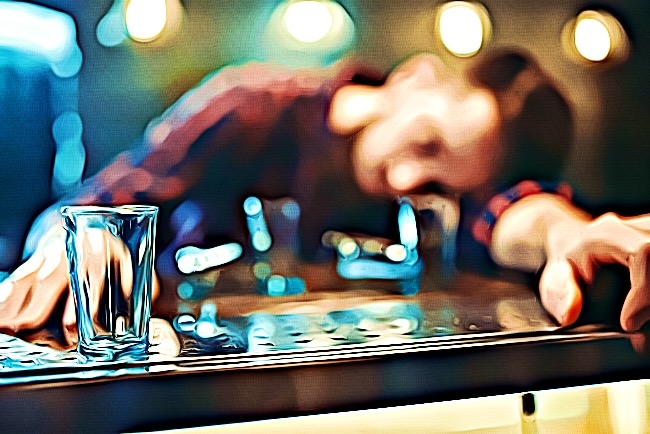The majority of people will consume alcohol at some point in their lives. In many settings, alcohol is exceedingly easy to obtain, socially acceptable, and nearly impossible to avoid. While some people find it easy to control their alcohol usage, others struggle with an almost continual and overwhelming need to drink.
Drinking is primarily about getting drunk for many of these people. They can’t seem to stop once they get started. When a considerable amount of alcohol is drunk in a short time, the consequences on brain function are surprising and dramatic. Inundating the body with large amounts of alcohol all at once, often known as binge drinking, disrupts the body’s ability to develop new memories.
An alcoholic blackout is what happens. People can lose track of where they were, who they were with, and what they were doing due to it. An alcohol blackout can last anywhere from a few minutes to many days.
Blacking Out
A period of alcohol-induced amnesia during which a person actively engages in behaviors such as walking or talking but has no recollection of doing so is known as blacking out. This is particularly dangerous since the person may try to drive, engage in unsafe or non-consensual sex, or engage in other risky actions resulting in severe and potentially life-threatening situations.
What Is Blacking Out?
What does it imply when someone says they “blacked out” the night before? “Blacking out” is a period of alcohol-induced forgetfulness in which an intoxicated individual actively engages in activities such as walking or talking but has no recollection of doing it.
A quick rise in blood alcohol concentration (BAC) levels is the most prevalent cause of blackouts, which result in a brief loss of memory when a person’s blood alcohol content (BAC) reaches around 14%. This is nearly double the legal limit, usually blackout. In addition to blacking out, an individual can experience “brownouts” or “gray outs,” which are milder alcohol-induced memory deficits.
It’s vital to note that blacking out differs from passing out in that the person remains completely aware. Anything a person can do while drunk can also be done while blacked out; the only difference is that they won’t remember it the next day.
However, during a blackout, a person will be able to recall events that occurred before their blood alcohol concentration (BAC) reached dangerously high levels. This allows blacked-out people to continue discussions and recollect anecdotes from earlier in the evening when they were inebriated.
What Does an Alcohol Blackout Entail?
Thankfully, alcohol blackouts are only transitory. These incidents have an impact on your memory. They’re characterized by a sense of being lost in time or memory “glitches.”
When you consume too much alcohol, you will experience blackouts. Because alcohol affects your body’s ability to develop and store new memories, this is the case.
Alcohol has diverse effects on different people. As a result, not everybody will be affected by blackouts. Many things, including: influence this
- The weight of a person
- The rate at which someone consumes alcohol
- The type of alcohol consumed by a person
- The gender of a person
Because our bodies are all different, we will react to alcohol differently. Furthermore, the specific circumstances will have an impact.
What Is the Duration of An Alcohol Blackout?
When your body burns the alcohol, the blackout will end. Your brain can begin to develop memories again if there is no more alcohol withdrawal in your system.
Many people find that getting enough sleep helps them avoid blackouts. This is because it allows the body to process and recuperate from the effects of alcohol.
However, some people do not require sleep to recover from a blackout. They can digest the alcohol while awake. Blackouts can last anywhere from a few minutes to several days.
Almost everyone recovers from a drunken stupor. They can, however, be lethal in some circumstances.
What Are the Different Types of Blackouts?
A variety of variables can influence an alcohol blackout. Each of these conditions can induce a partial or total blackout.
The following are some of the most common causes of alcohol blackouts:
- consuming an excessive amount of alcohol
- drinking on an empty stomach
- excessive consumption of alcohol
- physiology of a person
As previously indicated, any of these factors can result in one of two types of blackouts. A complete blackout or a partial blackout are the two types of blackouts.
With verbal or visual cues, you may be able to recollect events after a partial blackout. Complete blackouts, on the other hand, result in long-term memory loss.

Who Are the People Most Likely to Have an Alcohol Blackout?
Some people are more likely than others to use alcohol. For example, middle-aged males who deal with drinking are at a higher risk of blackouts.
Young adults in college are another vulnerable category. Rather than physiological, societal pressure and conditions are to blame.
Additionally, women are more likely to experience blackouts. This has a lot to do with how women’s bodies handle alcohol versus how men’s bodies process it.
People who take sedatives like Xanax and OxyContin are more likely to have blackouts. These sedatives already harm the ability of the brain to form memories, and alcohol exacerbates the problem.
What Effect Does a Blackout Have on the Body?
Alcohol has various effects on the body. This is determined by a person’s level of intoxication and the length of time they consume alcohol. These can usually be classified into two categories: short-term and long-term consequences.
What Are the Short-Term Effects of Blackouts?
A person can still function normally during a blackout. They can still communicate with others and make decisions, but they can’t remember what happened.
People may encounter the following side effects:
- delay in responses
- difficulty in walking
- diarrhea
- dry mouth
- excessive impulsivity
- headaches
- ineffective decision-making
- nausea
- slurred speech
These signs specify that a person has a blackout, even if they aren’t aware.
What Are the Long-Term Effects of Blackouts?
The fact that binge drinking can leave a lasting impact on the brain is something many people are unaware of. Some of these issues, such as memory loss, are just transitory. Others, like liver disease, are irreversible.
Heavy drinking regularly can harm the frontal lobe. This can impact your capacity to complete tasks, store information, personality, and general conduct.
While you might believe it’s fine to have a blackout now and then, it can be hazardous in the long run. Your gag reflex is hampered when you blackout, which could cause you to gag or choke while sleeping.
Furthermore, blackouts increase your risk of damage. When you have a blackout, you are more likely to fall or get into a car accident.
How Can You Tell If Someone Has Blacked Out From Alcohol?
Knowing whether someone is blacked out drunk is critical, as it could save someone’s life, even your own. If you are around someone with a blackout, they will appear to be completely ignorant of their situation; however, some symptoms will alert you to their situation.
It’s critical to take the essential precautions and seek assistance if necessary. It’s critical to assist folks who are suffering from an alcohol blackout. To keep themselves and the people around them safe, they should seek aid if necessary. The following are some examples of how to identify whether someone is blacked out drunk:
- This person is easily sidetracked.
- They are unconcerned about others’ sentiments and become disrespectful and nasty.
- They are starting to get into fights with others and engage in unsafe behavior.
- The individual participates in activities or behaviors that they would not engage in if sober.
- They drank a lot of alcohol in a short period without eating or drinking anything.
- They are unable to concentrate and keep repeating themselves during the conversation.
Conclusion
A blackout is a dangerous symptom of excessive alcohol consumption. A blackout indicates that the person is endangering their health. During a blackout, you may become ill and injure yourself or others. Drinking too much alcohol might impair your brain and other organs in your body. If you or someone you know is routinely drinking and blacking out, it may be time to seek professional assistance from alcohol and drug rehabs.
Source: https://www.ncbi.nlm.nih.gov/pmc/articles/PMC6668891/
















